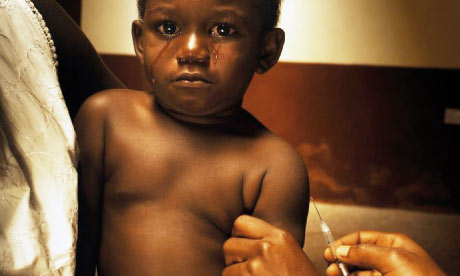via The Guardian, by Sarah Boseley
 "If we lose the ground we have gained, we will be back to square one – all that effort and investment, lost. The decisions you make here today will determine the outcome."
"If we lose the ground we have gained, we will be back to square one – all that effort and investment, lost. The decisions you make here today will determine the outcome."
The fund has been staring at a financial black hole ever since its big replenishment meeting in New York a year ago failed to deliver the sums it hoped for. It wanted $20bn. It got $11.7bn. That was in spite of exhortations to donors to pledge money from the UN secretary general, Ban Ki-moon, who warned that the stakes were high and that lives would be lost if pressure on the big killer diseases was not maintained.
It once seemed unthinkable that the money would not continue to stream into programmes to treat people with Aids, TB and malaria and to prevent others becoming infected. But that is what is happening. There is no doubt that people who could have been spared will instead fall ill and die as a result of the drying up of funds. There is also a Damoclean sword hanging over the heads of people who are alive and well thanks to drug treatment for their HIV infection. The Global Fund – together with Pepfar (the President's Emergency Plan for Aids Relief) – has been the main source of money to pay for drugs. Those who start the combination treatments to prevent HIV causing Aids must stay on the drugs for life. If they stop, there is a danger the virus will become resistant to the drugs they are on.
The Global Fund's board is buying time by telling governments not to put in new applications for funding for round 11, which is supposed to provide money for 2011 to 2013. It is offering a "transitional funding mechanism", which will allow countries to ask for money to cover essential needs. In recognition of the danger of stopping HIV treatment, this should allow countries to continue to supply drugs to people who are already taking them.
But, as Secretary of State Hillary Clinton said in her recent address, the need now is to step up the fight against HIV by providing more drugs – not less. Scientific studies showed this year that treatment makes people with HIV less infectious. Failure to keep rolling out the drugs to more and more people will waste an opportunity to deliver what she and others have hopefully termed "an Aids-free generation".
Read the rest.
[Content that is linked from other sources is for informational purposes and should not construe a Mapping Pathways position.]
 "If we lose the ground we have gained, we will be back to square one – all that effort and investment, lost. The decisions you make here today will determine the outcome."
"If we lose the ground we have gained, we will be back to square one – all that effort and investment, lost. The decisions you make here today will determine the outcome."In what must be seen as a serious setback in the progress made against the major infectious diseases in poor countries, a board meeting of the Global Fund to Fight Aids, TB and Malaria in Accra, Ghana, has effectively cancelled its next round of grant-making.
The fund has been staring at a financial black hole ever since its big replenishment meeting in New York a year ago failed to deliver the sums it hoped for. It wanted $20bn. It got $11.7bn. That was in spite of exhortations to donors to pledge money from the UN secretary general, Ban Ki-moon, who warned that the stakes were high and that lives would be lost if pressure on the big killer diseases was not maintained.
It once seemed unthinkable that the money would not continue to stream into programmes to treat people with Aids, TB and malaria and to prevent others becoming infected. But that is what is happening. There is no doubt that people who could have been spared will instead fall ill and die as a result of the drying up of funds. There is also a Damoclean sword hanging over the heads of people who are alive and well thanks to drug treatment for their HIV infection. The Global Fund – together with Pepfar (the President's Emergency Plan for Aids Relief) – has been the main source of money to pay for drugs. Those who start the combination treatments to prevent HIV causing Aids must stay on the drugs for life. If they stop, there is a danger the virus will become resistant to the drugs they are on.
The Global Fund's board is buying time by telling governments not to put in new applications for funding for round 11, which is supposed to provide money for 2011 to 2013. It is offering a "transitional funding mechanism", which will allow countries to ask for money to cover essential needs. In recognition of the danger of stopping HIV treatment, this should allow countries to continue to supply drugs to people who are already taking them.
But, as Secretary of State Hillary Clinton said in her recent address, the need now is to step up the fight against HIV by providing more drugs – not less. Scientific studies showed this year that treatment makes people with HIV less infectious. Failure to keep rolling out the drugs to more and more people will waste an opportunity to deliver what she and others have hopefully termed "an Aids-free generation".
Read the rest.
[Content that is linked from other sources is for informational purposes and should not construe a Mapping Pathways position.]

No comments:
Post a Comment